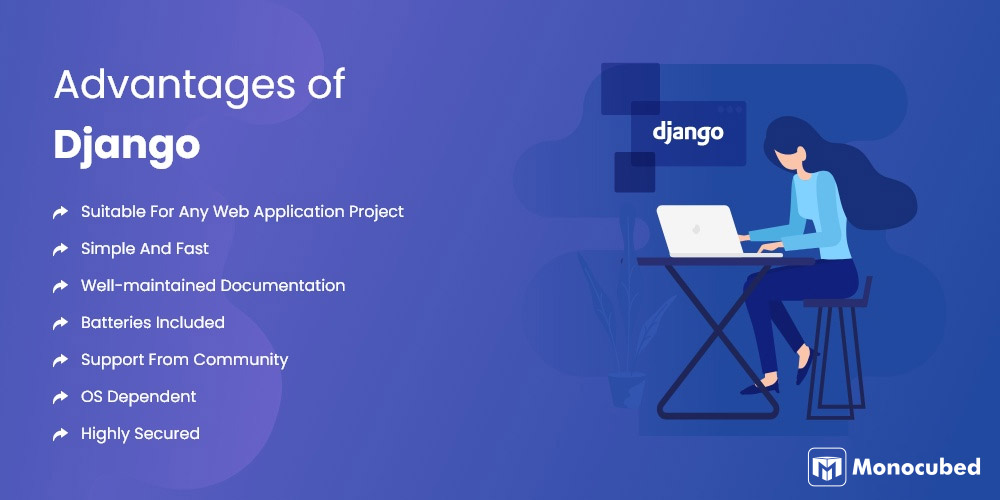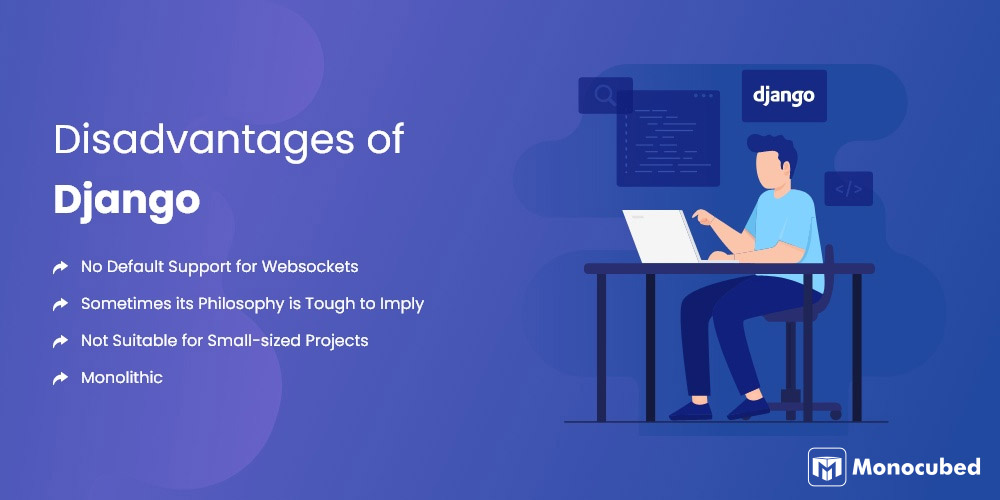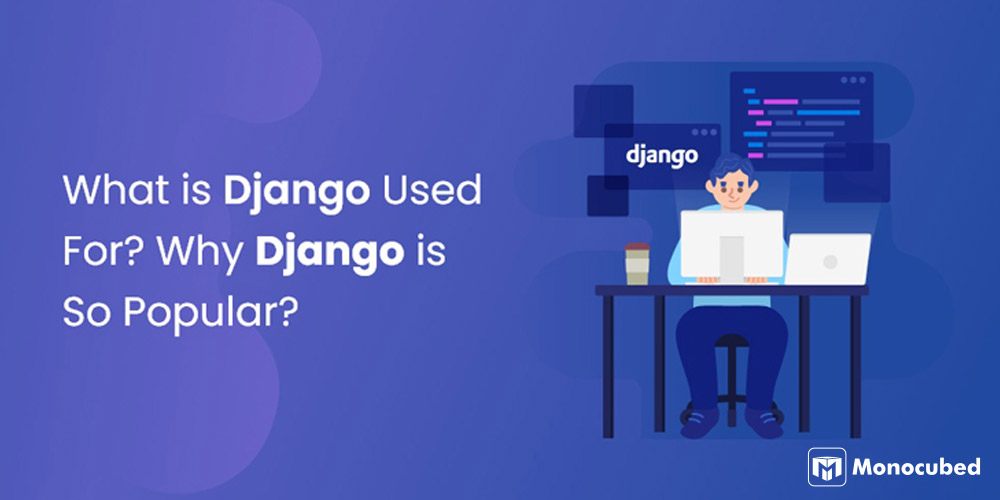Before beginning a new project, you are required to gauge which programming language and framework is apt for your desired results. Selecting a development framework amongst varied frameworks available in the market is a tough call.
Many companies prefer Django, a high-level Python framework, for their web application development projects. But what is the reason? What is Django used for? Let’s dive deep into the concept and usages of the Django framework.
Table of Content
What is Django Framework?
Django is a free and open-source Python-based framework that encourages pragmatic design and rapid development. It follows the model-template-views (MTV) architecture. It is upheld by the Django Software Foundation (DSF), an American self-governing association recognized as a 501(c) (3) not-for-profit.
Django is extremely fast and completely loaded as it takes care of content administration, user authentication, security features, and assists to evade cross-site scripting and SQL injection. It presents good documentation and loads of resources which aids new developers to learn and proficient developers refer for any development project needs.
How is Django Different from Python?
Django and Python are interconnected but certainly, not the same. Python is an object-oriented high-level programming language that has extensive library support. It makes the execution of various algorithms and programs easy. It aims to aid programmers in writing logical and error-free code for diverse projects.
On the contrary, Django is a web-based Python framework that sanctions you to develop robust web applications. It has inbuilt features like default database – SQLlite3 and Django Admin Interface. Below mentioned aspects depict the difference between Django and Python:
- Python is fundamentally an interactive, high-level, and interpreted language which functions on the compiler level, while Django is a Model-View-Template (MVT) framework developed on Python.
- Python is formulated by Python Software Foundation and released in 1991. Django was formed by Django Software Foundation and launched in 2005.
- Django is generally used in web-based servers and web applications. Python is used to create data analysis, web applications, and artificial intelligence software development.
- Django is utilized for web development. On the flip side, Python is exercised to build frameworks like Web2py, Django, CherryPy, Flask, to name a few.
Want to Amp Up Your Web App?
Use Django to take your web app idea to the next level with advanced AI features. Talk to our expert to validate your idea for free.
What is Django Used For?
The Django framework makes use of a potent Object-Relational-Mapping (ORM) layer. It streamlines dealing with data and databases and speeds up the development process. Without ORM, web developers would have to form the tabular display themselves and explain the operations or queries, which sometimes gets interpreted to the sizable amount of SQL that is inclined to be tricky and challenging to track.
Unlike the rest of the web development frameworks, its models are all arranged in one file. Usually, models.py, which might make it perceived as jammed for larger projects.
- Django also supports several database systems.
- SQLite works well for development and testing because it could get used without installing any additional software.
- PostgreSQL or MYSQL are apt for production.
- You can utilize MongoDB with Django if you want a NoSQL database.
Why is Django gaining immense popularity these days? Over the years as a Python app development company, we have used Django in a multitude of projects. Our development team prefers Django for its scalability, flexibility, and speed of development. Let’s explore more to find out what is Django used for:
-
Apps With Manifold User Roles
Django is preferable for building web applications and SaaS dashboards with manifold user roles. Django presents a large web admin interface that is produced automatically on developing web apps.
Such an admin panel is well-organized and it permits a developer to control users and other relevant data fields. It provides easy account development and form validations needed for creating user-profiles and administers other details like email, username, address, and phone number.
-
Flexibility And Scalable Web Apps
Django, an open-source framework, is appropriate for creating scalable web apps. This framework delivers most features that programmers consider while including in an app. It is simpler to build upon utilizing the components supplied by Django rather than develop customized components.
Django offers flexibility to increase traits and functionalities. It is very easy and reliable to have your web application framework with less code.
The Django framework is immensely modular and supports the REST framework which makes it seem more beneficial for developers. Moreover, APIs can be easily effortlessly unified to add more progressive traits to the app. This also sanctions the developers to utilize inbuilt API browsers for testing API endpoints.
-
Secured Enterprise and E-commerce Apps
Security is essential to any type of web application. Django facilitates efficacious protection against the most prevalent issues that a regular app is exposed to. Its template system sanctions protection against many Cross-site Scripting threats. This is done by escaping peculiar characters that are harmful in HTML.
Django also presents a tough defense toward clickjacking. Such clickjacking enables attackers to hijack clicks intended for a noticeable important link and route them to an ill-disposed page concealed underneath that link. These sorts of attacks are common on apps featuring payments namely eCommerce web apps and bank sites.
-
Composing Rapid SaaS Apps
Django permits you to make web applications faster as Django maintains the asynchronous view. By employing async code in web apps you can boost the performance of your app effectively. Therefore, inscribing the input/output methods in an async form can incrementally enhance the performance.
Additionally, for enterprise or SaaS applications, async views can also be applied for sending emails, performing write/ read operations, and calling third-party APIs.
-
Developing Cross-platform Apps
When constructing web applications, developers and creators look to support a diversity of user devices and OS to attain a broader audience. To promote this, they also require cooperative deployment settings.
The cross-platform type of Django provides support for all the production and development ecosystems. It also allows the flexibility to function the app code on any platform comprising Linux, PC, and Macintosh. Hence, accounting for the flexibility and modularity that the framework enables developers, Django can be employed for an assortment of applications.
Let’s take a concise view of the instances where Django can be used:
- Compatible with applications that require Content Management Systems (CMS) like online magazines, blogs with heavy traffic, and newspaper websites. A famous American newspaper named The Washington Times uses Django.
- The cross-platform django architecture assistance can let you produce mobile-friendly web apps.
- Financial fields with characteristics for calculating and analyzing and estimated results based on risk tolerance, personal data, and the probability of accomplishing goals.
- B2B CRM arrangements for controlling communication between companies.
- Inbuilt customized CRM practices for internal data.
- Remarkably helpful for high-load shopping platforms or booking engines.
- Platforms that expedite interaction between two bodies – a consumer and a business.
- Practiced for designing social networking sites wherein both multiple user roles and security are of eminent value. Youtube, Instagram, and Disqus are some of the popular social networking sites that practice Django.
- Beneficial for platforms that handle legal issues like verifying lease status or mortgage conditions.
- Highly effective for real estate section evaluation schemes and document management systems.
Usually, some enterprises prefer to build their projects on more than a single framework. Django can also get utilized to build distinctive features mentioned below:
- A filtering operation with high-level business logic and dynamically evolving rules
- An emailing policy that notifies to all the users
- Data-analysis tools
- Algorithm-based generators
- Admin dashboards
- Photo-based verification practices
- Interfaces for maintaining investment reserves
Advantages of Using Django

The chief purpose of Django is to empower developers to concentrate on components of the app that are novel instead of squandering time on previously built ones. It is more feature-rich than the rest of the frameworks in the market. It takes care of all the hassle of the web development framework.
-
Suitable For Any Web Application Project
You can undertake schemes of any size – a high-load web application or a simple website in the Django web framework. Still, the question triggers – “Why use Django for your project?” And the answer is:
- It is cross-platform, indicating that your project can be based on Linux, Mac, or PC.
- It is entirely loaded with additional traits and is scalable. Hence, you can produce applications that manage large volumes of information and heavy traffic.
-
Simple And Fast
Django’s principal intent is to simplify tasks for developers. For that, the framework employs:
- Don’t Repeat Yourself (DRY) philosophy which indicates that developers can reuse the current code and concentrate on the novel one.
- As a consequence, it takes much less time to get your project out in the market.
- The policies of a rapid development environment, which implies that developers can perform more than one iteration at a given time without beginning the whole plan from scratch.
-
Well-maintained Documentation
Django is crowd and time tested. It has a large community accessed through various channels, dedicated websites, and forums. It commenced with exceptional documentation and is still well-maintained.
It gets regularly updated along with the latest fixes and functions so that you can adjust to the variations easily. The software gets modernized uniformly and novel packages are published to make operating with Django more beneficial.
-
Batteries Included
The batteries included the methodology of the Django framework means that it has everything essential to build a mature application.
It offers inbuilt URL routing, HTML templating, session management, and object-relational mapping, helping web developers evade the search for third-party tools. Numerous Django packages aid you to quickly create anything from complex GPS-enabled solutions to chatbots. Its main features are:
- Security, views layers,
- Template layers,
- Python compatibility, model layers,
- Forms,
- A geographic framework, general tools for web application development
- Performance, optimization, and localization,
- Other fundamental functionalities are vital for websites.
-
Support From Community
The community of Django is extremely helpful. They are working actively on stabilizing the framework while adding new features and making it more beginner-friendly. Its documentation is fairly exhaustive and is beneficial as a tutorial. It will help you gain an understanding of various characteristics that you can utilize as a chief source of data.
-
OS Dependent
Django runs on platforms like Mac, Windows, and Linux. It offers a layer between the database and developer known as object-relational mapper (ORM) which makes it likely to migrate or move applications to other chief databases with a few lines of code modification.
-
Highly Secured
Security is a high priority for the Django framework. It has one of the best security systems which aids developers to circumvent common security issues, comprising cross-site scripting, SQL injection, and clickjacking.
Django releases fresh security patches promptly. It is commonly the first one to reply to susceptibilities and alert the rest of the frameworks.
Have a Web App Idea?
Confused where to start? Don’t know how much it will cost? Wondering if it will be successful? We’ve got you covered. Let’s talk.
Disadvantages of Using Django

While Django is an incredible framework, there are a few disadvantages that may or may not be an issue. The URL stipulating with fixed expressions is not an easy assignment to achieve for beginners. It feels a little bloated for small-sized projects. Some individuals find it populated with big-sized projects since models are all encompassed in a single file.
Let’s examine in detail the disadvantages of using Django:
-
No Default Support for Websockets
WebSockets permit you to update events or information in actual time. The Django framework does not support real-time web apps yet. Hence, you ought to employ other programming languages and frameworks.
-
Sometimes its Philosophy is Tough to Imply
Certain internal Django modules, namely the admin panel, are tough to tune owing to Django’s philosophy. For instance, if you need to add dynamic statistics, links, or something distinctive that is not contained in the Django environment, it can take more hours.
-
Not Suitable for Small-sized Projects
All the facets of Django have numerous codes. It consumes the server’s time and processing, which renders some problems for small-scale websites. Also, it can run on extremely little bandwidth.
Sometimes it can be extreme, but Python sanctions you to use other frameworks to build simple elucidations. For example, if you require a simple chat, Django can be excessively large. Instead, you can opt for Flask – python web framework, as your microservice framework.
-
Monolithic
For the ‘batteries included’ feature in Django, it is quite monolithic. It has an inadequate count of dependencies which makes it challenging to employ. Its programmers contemplate this framework as a single bundle, which is not apt.
The lower dependencies it has, the more code web developers will have to formulate. Django does not encourage web developers to study Python tools and packages. Instead, web development emphasizes delivering programmers with more code-based programming.
Frequently Asked Questions
Is Django better than Node.js?
Django vs Node.js states that Django is exceptional in handling high-traffic apps and numerous requests; whereas, Node.js is preferable in creating robust apps and can administer ample requests. Both the frameworks are appropriate for developing scalable apps.
Is Django used for frontend or backend?
Django is an open-source Python web framework for backend web apps. Its prime goals are flexibility, simplicity, scalability, and reliability. It has its naming scheme for all components and functions, for example, HTTP responses are known as ‘views’.
How is Django different from Python?
Django is a Python-based web framework that permits you to develop powerful web apps easily. While Python is a high-level, object-oriented language that has massive library support making the web application of several algorithms and programs easy.
Conclusion
From the above blog, we have seen the vital aspects stating what Django is used for. This framework is versatile and permits the developers to focus on business logic rather than writing general utilities. Contact Monocubed and get your applications to offer reliable, scalable, and fast services based on traffic.
Django helps developers to build customized web apps using Python by offering many plug-ins, tools, and features. It has libraries, APIs, and templates which function together. Thus, you can use Django to develop applications with minimal changes, additions, and cost.
 By Jeel Patel
By Jeel Patel



